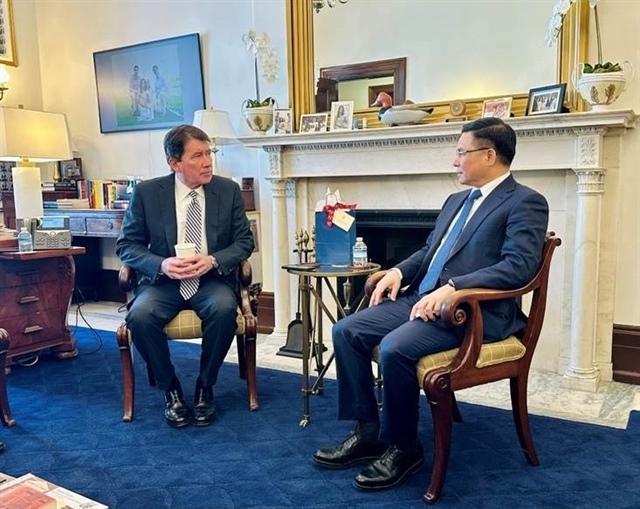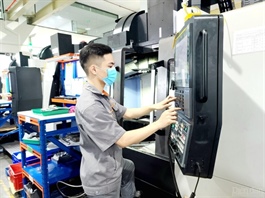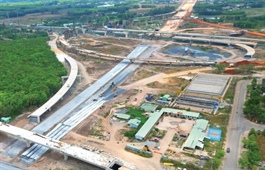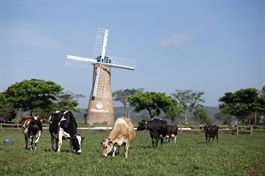Germany and Vietnam agree on new pillars
Germany and Vietnam agree on new pillars
Vietnam and Germany are set to elevate their bilateral ties, paving the way for intensifying investment and trade cooperation, especially in new industries.
Vietnamese Deputy Prime Minister, Minister of Foreign Affairs Bui Thanh Son early this month spoke with newly appointed Germany’s Minister of State Johann Wadephul on the phone.
“The two sides emphasised the need to soon elevate bilateral relations, expand each other’s markets, and promptly complete the ratification of the EU-Vietnam Investment Protection Agreement,” stated the Vietnamese Ministry of Foreign Affairs after the call.
“They also agreed to make science and technology cooperation a new pillar in bilateral cooperation, especially in the industries of clean energy, nanotechnology, quantum technology, semiconductors, digital transformation,” the ministry said. “In addition, the two sides also agreed to boost cooperation in education and vocational training.”
Vietnam and Germany also agreed to continue to closely coordinate in organising practical activities to celebrate 50 years of diplomatic relations in 2025; and promote exchanges and make careful and effective preparations for visits at all levels.
The two countries forged diplomatic ties in September 1975 and lifted their relationship to a strategic partnership in 2011.
Vietnamese Deputy Prime Minister, Minister Son proposed major orientations to deepen and further substantiate the strategic partnership in the fields of politics-diplomacy, trade and investment, science and technology, education and training, sustainable development, and more.
Minister Wadephul declared that Germany wishes to strengthen the friendship and multifaceted cooperation with Vietnam. He stressed that the German government and businesses stand ready to cooperate with Vietnam in the prioritised sectors, including energy transition.
Currently, both nations are focusing on expanding their trade and investment cooperation.
“In 2025 and beyond, trade and investment cooperation between Germany and Vietnam holds immense promise,” said Helga Margarete Barth, German Ambassador to Vietnam. “This partnership is not only vital for the economic growth of both nations but also serves as a strategic alliance in an increasingly complex geopolitical landscape. In an era of growing global uncertainties, Germany and the EU are reliable partners at Vietnam’s side.”
This year, 50 years of diplomatic relations between Vietnam and Germany will be celebrated, Barth noted.
“This jubilee is a testament to our strategic partnership that has grown from early trade ties into a deep and dynamic collaboration in many fields,” she continued. “It highlights not only Vietnam’s economic success but also the potential for further growth in the bilateral relationship, providing opportunities for both nations in the years to come.”
Trade remains a cornerstone of German-Vietnamese economic relations. According to preliminary 2024 data from Destatis, trade between the two countries grew by 9.6 per cent, reaching €18.8 billion ($20.4 billion). German exports to Vietnam increased by 5.6 per cent ($4 billion), while imports surged by 10.7 per cent ($16.4 billion).
Under statistics from the Vietnam Customs, in this year’s first four months, bilateral trade hit nearly 4.5 billion, up 23.3 per cent on-year – including Vietnamese exports of $3.3 billion, up 27.8 per cent, and imports of $1.2 billion, up 12.4 per cent.
According to the Delegation of German Industry and Commerce in Vietnam, Cambodia, Myanmar, and Laos (AHK), these figures “underscores Vietnam’s role as a key supplier and manufacturing hub for German firms”.
AHK said that Vietnam has become a key hub in global supply chains, with particularly interesting developments in manufacturing, renewable energy, and digital services.
“German businesses benefit from its strategic ASEAN location, free trade agreements, and highly motivated workforce. With tax incentives, improved infrastructure, and streamlined regulations, Vietnam continues to attract foreign investment, solidifying its role as a prime destination for German enterprises,” AHK said.
This positive trade landscape is largely attributed to the EU-Vietnam Free Trade Agreement, said the Vietnam Customs.
According to statistics from the Foreign Investment Agency under the Ministry of Finance, currently, about 500 German companies are effectively operating in Vietnam, of which around 80 per cent have manufacturing plants in the country, creating around 47,000 jobs. Cumulatively, as of May 31, German firms had 495 valid ventures in Vietnam, registered at $2.8 billion.
German enterprises appreciate Vietnam’s affordable and high-quality labour, as well as the open investment environment provided by the latest legislation. The growing national market with its increasing middle class powering further economic growth provides attractive sales opportunities.
More than half of the German companies are concentrated in the south of Vietnam, with Ho Chi Minh City being the commercial centre. Some of the oldest and biggest German investments lie in the cities of Hanoi and Haiphong in the north, while central Vietnam is attractive because of its lower land and labour costs as well as good living conditions.
Many German companies have established a strong presence and invested heavily in Vietnam, making it a significant destination for German foreign direct investment. They participate in many sectors such as automotive (Bosch, BMW, Mercedes, Schaeffler, Dräxlmaier, and Leonhard Kurz); electronics and digital solutions (Siemens and OKE); pharmaceuticals (Stada–Pymepharco and B. Braun); and chemicals (Messer Gases).
The largest German investments have been deployed by Bosch, Stada-Pymepharco, and Messer Gases. Bosch is employing a major manufacturing complex for push-belts in the southern province of Dong Nai, while also operating a research centre in Ho Chi Minh City. Stada-Pymepharco manufactures pharmaceuticals in the south-central Phu Yen province, while Messer supplies gases to local customers such as Hoa Phat from its main production hubs in the northern province of Hai Duong and the south-central province of Quang Ngai.
Elsewhere, German developer PNE AG plans offshore wind farms off the coast of the south-central province of Binh Dinh, with a capacity of up to 2GW and an investment volume of several billions of US dollars.
- 10:53 17/06/2025



























